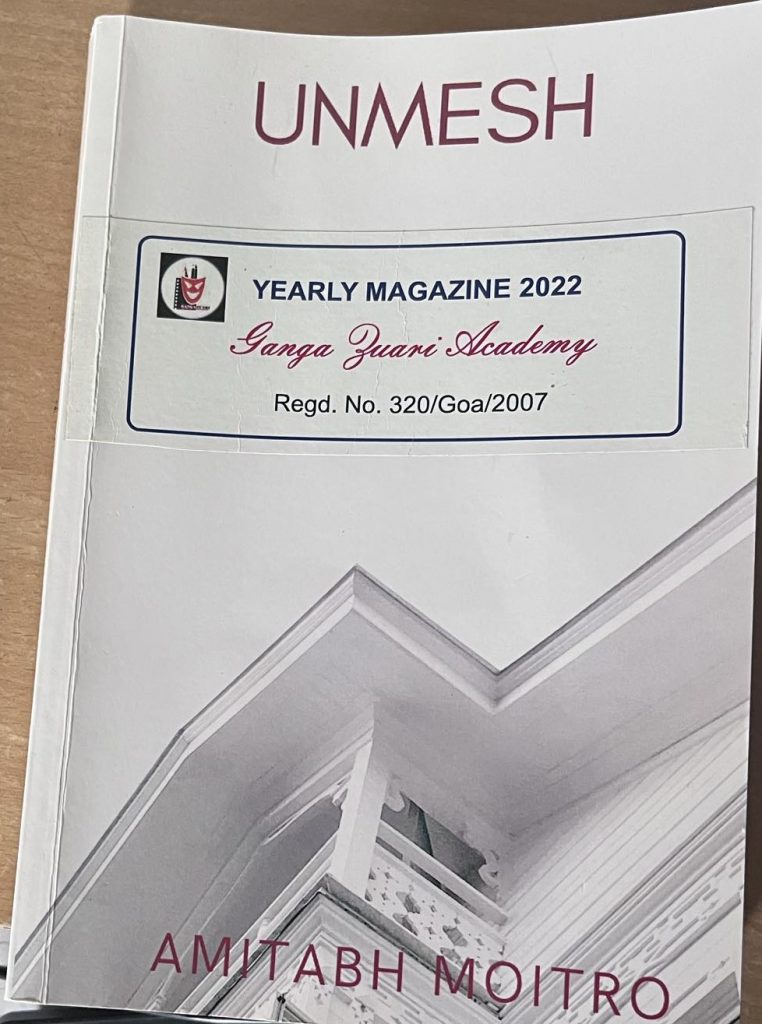Goa is abuzz with excitement as vintage bike and car owners, users, collectors and fans are decking […]

OF THIS, THAT AND SENIORS LOOKING FOR A LIFE!
May 31- June 06, 2025, ON MY OWN May 30, 2025THIS is to say I’m turning my Potpourri column back into an old column I wrote for a number of years in Bombay that has become Mumbai! This one gives me more room to go with the flow of life and living and a larger canvas like every morning I wake up nowadays wondering if the war in Palestine has been resolved, if the Russian President Putin has stopped wanting to make mincemeat of Ukraine…the world is at war and the rest of world is waiting to see what happens and who are the biggest beneficiaries vis-à-vis power, profit and control (as Prof Shiva Ayadurrai of ruthFreedomHealth movement has been putting it so perfectly, he offers some of the best insight in world politics today)!
It’s a new world unfolding for millionaire, billionaire, trillionaire businessmen in and out of governments around the world seeking mindboggling profits for more homes, more cars, more private jets, yachts, palatial homes at prized holiday destinations around the world, also of course more beautiful young women for more children; generally speaking more of the good things of life to kingdom come.
Something like that and we common ordinary people who do not have fortunes at our disposal look on with amusement if not outright disgust at the extravaganzas incarnate of the colossally wealthy class in and out of powerful positions deserved or mostly undeserved!
WHAT is funny and not funny is that at the top of the ladder of the good life so many may not want to pay hefty taxes on their fortunes earned or acquired, but they’re ready to engage in charitable deeds like Robin Hoods stealing from cuts here and there in business deals and games of chance – to magnanimously return a few charitable crumbs to the working classes and the poorer and more unfortunate folk further down the ladder who have nothing left over after their daily needs are met frugally…well, think about all this while I move to something else.
GANGA ZUARI 19TH FOUNDATION DAY
I’M sorry I wasn’t able to make it to the Ganga-Zuari’s Academy’s 19th foundation day celebration at the International Center Goa on Sunday, May 25, 2025. The GZA has come a long way since its formation way back in 2006 by a group of like-minded members of the Bengali community settled in Goa since long since, the GZA was formed with the aim of sharing ideas with the host society in Goa and open up broader, more cosmopolitan and sophisticated connections with one another in and also out of the community. Today their 700 odd members have many non-Bengali members too including niz Goenkars.
If you hail from Bengal where the British Empire’s English East Indian Company first set up its headquarters to rule India and the rest of its colonies in Southeast asia…one cannot help but consider how much of the British language, cultures and ways must have rubbed off on native local communities upper crust and not so upper crust!
GZA President Bimal-da tells me it was really a Rajendra Prasad Pal (now residing in Chandigarh) who was the driving force behind GZA’s unique approach to life and living in Goa or I suppose anywhere else outside West Bengal or Bengal in general. It is natural that wherever we go in search of a qualitatively better livelihood and prosperity, we want to bridge cultural divides and foster new connections between people coming from a different background and culture…to bridge and build common ground with native host societies. Why? To live in peace and harmony, all that.
Anyway, I consider the GZA one of the most affable, gregarious and open-minded organizations in Goa. Recently, I found out that it has been bringing out an annual magazine – UNMESH, Yearly Magazine – and I’ve got a copy of “Unmesh” (Volume 1, May 23, 2022) in my hand courtesy Bimal-da. It has been brought out by GZA’s Amitabh Moitro. “Unmesh” is one of the most engaging multilingual literary magazines, offering a range of articles or art, social philosophy, stories, poetry, reports, history, even obituary write-ups and people and society in general.
Interestingly, in the Foreword, Dr Maria Emilia Dias Menezes (managing director, Indi Pharma Pvt Ltd, chief patron, Ganga Zuari Academy) shares… “Unfortunately, today’s world has become increasingly dominated by social media, 24/7 news channels that offer less news but more truncated opinions, random violence, and divisive political views. A literary magazine is to heal such a trend. It is one of the few places a reader can turn to for creative, humane, and often lyrical perspectives on life. Literature can provide a refuge from current events and, at the same time, offer insights into the contemporary world…” There’s much more worth reading in this issue and I suggest you get yourself a copy of “Unmesh.” It takes a liberal, most educative and analytic look at our life and times…hey, I’d forgotten that the much loved Sir Rabindranath Tagore, who won the country’s first Nobel prize, was so disturbed and disgusted by the infamous Jallianwala Bagh massacre of April 1, 1910 that he returned his knighthood to the British Empire! Read all about in “Unmesh.”
I must say this is altogether a real fascinating treat of a find for reading up on several pertinent issues, these monsoon season in Goa; contributions are by erudite, familiar names, for example Arijit Choudhuri, Rajiv Nigam, Panakmpani Bharadwaj, Rinki Bhattacharya, Lata S Naik, Suresh Nigam (“Britons in the 18th Century in Portuguese Goa”), Rita Sorowar, Nandkumar Kamat (“DNA discovery completes 150 years”), Abigail M Rebello, Garima Shukla and many more familiar and new bylines for me at least but I’m happy to discover them. Here’s a most invaluable happy collection you need and want to catch up with regardless of whether you’re Bengali or not, Indian or not!
HEY, make the most of the monsoon rains for creative thinking about how to end the troubles of the world in which we all pine to live and die with dignity! These days I have on my mind constantly all the little things which seniors are need of around me, regardless of whether they live in lovely homes or tacky rentals. Not one of the several organizations who speak in the name of frail seniors think of home services. Services like what? Please, can you come home and give a patient a shave and haircut? A massage? Take him for a dental appointment? Take her for a walk outside in the compound of my housing society? For an outing? Do some shopping? Drop in and cook a simple dal-bhat or roti-sabzi for lunch…less oil, less salt, less spicy?
As a friend of mine who is caretaking her invalid mother says, I can’t find a place where I can take my mother for watching over for a few hours, or a day or two or a week while I go off on an urgent errand! No, on honorary basis, but on modest payments of say Rs100 an hour? Most enquires she makes with the variety of caretaking agencies sometimes want Rs500 an hour or forget it, “Madam, we can send you a caretaker around the clock for Rs2,000 a day and night…you must give food!”
Mind you it’s not just the working class seniors who are in need of a range of ad hoc services, my wealthy senior friends too need them, says one of them, “I wish someone would visit me just to have a cup of tea with me! When I’m in hospital for a surgery my dog and cat at home starve because the maid bunks work…” Even someone to come and do “jaddu-pocha” when the regular domestic takes leave!
Well, think about all these my friends. Ad hoc services of the very useful and happy kind anyone? You coming to babysit my grandfather for a few hours while I go out to do a job I need to do?? Come and watch a film with him on television, take him out to see a film, for a meal, etcetera. Even dogs and cats have several homes away from home to be cared for at nominal rates but not seniors stuck at home with or without a member of the family! On that note I will say avjo, poiteverem, selamat datang, au revoir, arrivedecci, hasta la vista and vachun yeta here for now.
—Mme Butterfly
Excerpted from ‘Unmesh’, Yearly Magazine 2022, of the Ganga Zuari Academy…
The Return of Knighthood
Articulated by Amitabh Moitro
Rabindranath Tagore’s magically worded letter of 1919 to His Excellency, requesting to relieve him of his title on Knighthood evoked extreme feelings of empathy to fellow Indians.
Jallianwala Bagh massacre was staged on 1st April 1910. To a normal town crowd, celebrating festivities in open ground, surrounded by walls, the British had opened fire and killed 379 people.
But as the British govt. had gagged the media with an iron hand, the news was not published in any newspaper in the country. The people could not know the brutality that has been inflicted upon them.
Gurudev Tagore got the news at his Calcutta residence from the words of some travelling dignitaries, visiting him. He seethed in anger against such oppression. He asked national leaders at Calcutta to protest against this barbarism. But their response was evasive. He then sent his emissary (CF Andrews) to Delhi to rope in national leaders there for this protest. But the emissary returned empty-handed. All leaders avoided any protest against the British which would invite ire from them. The news of brutality was still not open.
The day the emissary brought the news of the cold shoulder of Delhi leaders, the poet sunk into an abnormal silence. He had been extremely angry and getting tormented inside. Such shameful bigotry! Such a dark mind behind a face in the lit-up glare!
In the evening, an admirer paid a regular visit to the poet’s home. But the poet abruptly dismissed him, asking him to leave as he has a job at hand. Poet went to his room and closed the door. The light in the room shone the whole of the night. He had not come out.
The admirer also got highly surprised. Such rudeness from the poet was unheard of. Back home, he tossed himself on his bed, missed his sleep and feared for the poet’s illness. Next morning at pre-dawn hours he worriedly came again to the poet’s house to enquire about his health. The servant disclosed that the poet was awake all night. God! What is brewing up?
Then the poet came down the stairs to the sitting lobby. He was wearing signs of sleeplessness but looking cheerful. He greeted him and handed him a paper. It was a letter addressed to the governor-General.
The admirer read it.
What a language, what a fit of seething anger and disgust! Also, intense empathy for the countrymen! He got goose-bumps as his reading progressed. His anger against the action of the British is woven around every fiery line. And at the end, he renounced the Knighthood that queen had conferred on him 4 years back (in 1915, he got the Nobel in 1913).
The visitor looked up in amazement. The poet was back in his jovial mood. A faint smile hanging over his face was expressive of deep satisfaction. He said, with his eyes set n something far away, as if words are coming from a deep crevice, when none is willing to come forward , at least I can do this. It does not warrant anyone’s participation.
The letter was released to the press. The letter dated 31st May 1919 was published in the Statesman on 3rd June 1919. It was circulated as a pamphlet in London.
The barbaric and inhuman act was not even supported by the British. The then Government of India ordered an investigation of the incident (the Hunter commission), which in 1920 censured dyer for his action and ordered him to resign from the military. However, twenty-one years later in 1940, in retaliation for the massacre, general Dyer was assassinated in London by the Indian revolutionary Udham Singh.
(Amitabh Moitro is a former banker. General Secretary of GZA and Editor of Unmesh. He lives in Goa.)
Transcript of Tagore’s above letter to British Excellency
31ST May 1919
Your Excellency,
The enormity of measures taken by the government in Punjab for quelling some local disturbances has, with a rude shock, revealed to our minds the helpless of our position as British subjects in India. The disproportionate severity of punishment inflicted upon the unfortunate people and the method of carrying them out, we are convinced, are without parallel in the history of civilized governments, barring some conspicuous exceptions, recent and remote. Considering that such treatment had been meted out to a population, disarmed and resource less, by a power which has the most efficient organization for the destruction of human lives, we must strongly assert that it can claim no political expediency, far less moral jurisdiction. The accounts of our insults and sufferings undergone by our brothers in Punjab have trickled through the gagged silence. Reaching every corner of India, and the universal agony of indignation roused in the hearts of our people has been ignored by our rulers possibly congratulating themselves for imparting what they image as salutary lessons. This callousness has been praised by most of the Anglo-Indian papers which have in some cases gone to the brutal length of making fun of our sufferings, without receiving the least check from the same authority – relentlessly careful in smothering every cry of pain and expression of judgment from the organs representing the sufferers. Knowing that our appeals have been in vain and the passion for vengeance is blinding the noble vision of statesmanship in our Government, which could so easily afford to be magnanimous as befitting its physical strength and moral tradition, the very least I can do for my country is to take all consequences upon myself in giving voice to the protest of millions of my countrymen, surprised in dumb anguish of terror. The time has come when badges to honour make our shame glaring in their incongruous context of humiliation, and for my part wish to stand short of all special distinctions, by the side of those for my countrymen, who for their so-called insignificance, are liable to suffer a degradation not fit for human beings. These are the reasons which have painfully compelled me to ask Your Excellency, with due deference and regret, to relieve me of my title of Knighthood, which I had the honour to accept from His Majesty the King at the hands of your predecessor, for whose nobleness of heart I still entertain great admiration.
Yours faithfully,
Rabindranath Tagore,
6, Dwaraka Nath Tagore Lane, Calcutta.















